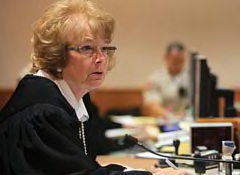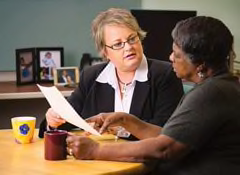| Scenario |
Solution(s) |
|---|
You visit your father every few weeks. Recently you looked at his bank statement and saw several checks that he can't explain.
|
Did your father write the checks? If he didn't and does not know who did, he should file a police report. A common tactic of abusers is to write checks to themselves from their victim's checkbook, expecting the senior to later forget or be confused about writing the check. If your father did write the checks and doesn't recall doing so, he may have a capacity problem. If that's the case, you should have him assessed by his physician, says Roger Demers, special assistant attorney general, Rhode Island Department of Attorney General.
|
You've given your favorite nephew several loans. His requests are getting larger and more frequent. He can get very angry when challenged, so you're reluctant to say no.
|
If you have a hard time refusing his requests, get someone to assist you with your finances. Then you can tell the nephew that you are no longer handling your money and he will have to go through the other person with his requests. That takes you out of the position of having to say no and lets him know that someone else is looking over things, so he might be more likely to stop asking, suggests Sally Smith, adult protective services case manager supervisor, Franklin County (Ohio) Office on Aging.
|
Several times when you've called your aunt's home in another state, her caregiver tells you she's sleeping, or too tired, or just can't come to the phone.
|
Contact law enforcement to conduct a "well check." They will make contact with your aunt and report back to you what they find. Whenever you suspect abuse, neglect, or exploitation, immediately contact your state's abuse hotline, says Allison Bryant, statewide elder-abuse prevention coordinator for the Florida Department of Elder Affairs.
|
The woman who drives you is like a daughter. Once, when you weren't well, you gave her your ATM card to do errands for you. Now, when you ask her where the card is, she changes the subject.
|
Close that account, check to make sure that no unauthorized withdrawals have been made, and sever the relationship. If there are such withdrawals, make an immediate police report, says Paul Greenwood, deputy district attorney in San Diego and head of the county's elder-abuse protection unit.
|
The woman who drives you is like a daughter. Once, when you weren't well, you gave her your ATM card to do errands for you. Now, when you ask her where the card is, she changes the subject.
|
Close that account, check to make sure that no unauthorized withdrawals have been made, and sever the relationship. If there are such withdrawals, make an immediate police report, says Paul Greenwood, deputy district attorney in San Diego and head of the county's elder-abuse protection unit.
|
Your brother lives with your mother. He doesn't have a job, and he doesn't pay rent. When he drinks, he is mean to your mother. You think that she's been giving him money and that she is afraid of him.
|
Ask her whether you can take control over her funds so that you are the go-to person if he has questions about her money, says Debra G. Speyer, elder-law attorney in Philadelphia.
Talk to her when he isn't around. Unfortunately, if she's been enabling him his whole life, chances are you're not going to get her to stop, says Sally Smith, adult protective services case manager supervisor, Franklin County (Ohio) Office on Aging.
If there are signs of physical abuse, involve the police, says Martha Crippen, elder-abuse investigator, Rhode Island Department of Attorney General.
|
Your brother, who has power of attorney for your father with Alzheimer's disease, won't let you look at your father's accounts. But recently your brother bought a fancy car, and you're suspicious.
|
The fancy car might be a red herring, but it might indicate that your brother is taking your dad's funds. Does your father have any capacity to discuss this with him? Perhaps a meeting with the three of you discussing this might help. If all else fails, you could go to court and request an independent conservator or guardian over your dad because of his dementia and request that the power of attorney be voided because of your brother's improprieties, says Debra G. Speyer, elder-law attorney in Philadelphia.
|
























